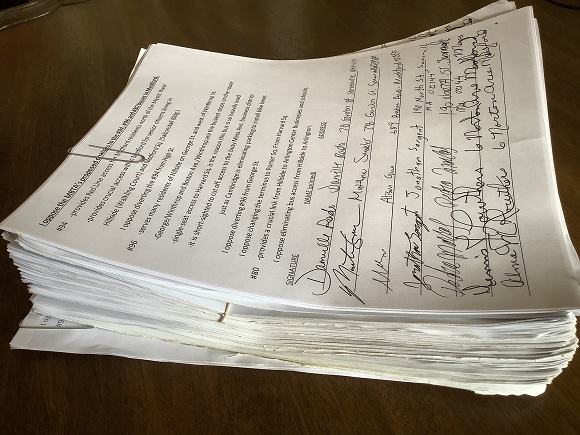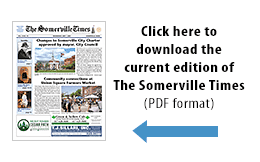
A small group of concerned residents in Medford and Somerville started a grass-roots effort to notify their neighbors about the proposed changes to the MBTA bus routes in those cities. They have been putting up posters, alerting residents on neighborhood websites and going door-to-door. They have collected over 2,000 signatures from residents in Medford and Somerville over the last three months since the MBTA released their proposal. Members of the state delegation for Medford and Somerville share many of the concerns and are now calling on the MBTA for a more transparent process with more time for incorporating community feedback.
“Virtually no one has heard about this proposal. Most people are stunned to hear the details, and they are eager to sign the petition opposing the changes,” said Mary Anne Adduci of Medford, one of the members of the group that also included Anita Nagem of Medford, and Helen Schwickrath and Judith Wynn both of Somerville.
Earlier this year the MBTA released a proposal for the Better Bus Project, Bus Network Redesign. The plan was laid out online for MBTA customers and residents to see the changes to their bus routes. The MBTA hosted virtual meetings through May, June, and July to present their proposal for each city and town and allow for some feedback.
Like many residents and bus riders, Anita Nagem felt that the MBTA’s lack of outreach was unacceptable, and that this proposal would have a major impact on people’s lives if it were implemented. She decided to start a petition. Many residents reached out to their local and state officials to ask more questions and express the concerns they were not given the chance to during the MBTA hosted meetings. The petition requests that the plans be modified with community input and that any revised plan be presented to the public for further feedback before being put up for an MBTA board vote.
“As soon as the MBTA made their proposal to change the bus network, I began to hear dissatisfaction and concern from many residents,” said Senator Patricia Jehlen of Somerville. “I am grateful for the work of our neighbors in Medford to bring attention to the network redesign changes and to collect these signatures. The MBTA must ensure a transparent process that allows the voices of all riders to be heard and considered and should take more time to do that.”
“With such significant proposed changes in the MBTA’s Bus Network Redesign, I appreciate the hard work of my constituents in Medford and Somerville to outreach neighbors, gather input and signatures in response,” said Representative Christine Barber of Somerville. “The MBTA needs to hear and consider feedback from local residents who rely on the bus to get around our community itself, travel to work, school, grocery shopping and appointments. It is critical to ensure that any changes to routes do not disrupt access for those who need it most.”
“I’m very upset about the changes that are being made in regard to the Better Bus project,” said Representative Paul Donato of Medford. “It seems the city of Medford is being short-changed by the MBTA. We need more input from our residents to ensure that they have the opportunity to utilize safe and accessible public transportation services.”
“Many of these proposed changes would affect the core of the MBTA’s ridership,” said Representative Sean Garballey of Medford. “Working families, students, people of color and those with limited economic means will be hit hardest when relied upon transit routes are changed. We urge the General Manager to listen to the daily riders in our inner core communities and reconsider drastic alterations without commuter feedback.”
“There are many reasons why the MBTA should not eliminate any bus service from Somerville, Medford, Cambridge or other local communities at this time,” said Representative Mike Connolly of Cambridge. “For one thing, the Green Line Extension isn’t even fully operational yet — we shouldn’t make any decisions on bus consolidation until we get a chance to see how the completed GLX actually impacts local bus trips. Moreover, Massachusetts voters will get to decide on billions of dollars in new revenue for transportation via the Fair Share Amendment this November. It makes no sense to cut bus service now when billions in new revenue could be on the way.”
“I have heard non-stop from constituents of all walks of life, including elderly, disabled, and parents, about how these changes would negatively and significantly impact their mobility and livelihood,” said Representative Erika Uyterhoeven of Somerville. “I urge the T, as a core public good that ensures transportation as a human right for our community, to consider carefully how their decisions impact some of our most marginalized residents.”
The group delivered the petition with all the more than 2,000 signatures to the MBTA at the final scheduled meeting, Thursday, July 28 at the state transportation building. The deadline for all public feedback is July 31.
— Office of Senator Jehlen
















The Green Line extension is great for those who live near it but instead of going to Route 16 it ends at Tufts… seven bus stops from me. Wouldn’t want to walk it in the snow or rain, and the T adds insult to injury by cutting back bus service. Answered the questionaire and am glad local officials keeping the pressure on the people who proposed this.
As a family of four we rely on daily bus service (89, 80, CT2), get to school (in east Somerville), work, sports practice, recreation (tennis and pool at Dilboy and Foss Park)), and services (food/medical in Teele/Davis). I am hopeful that the MBTA will see the importance of role of ‘local’ bus service in connecting within the community of Somerville. I am advocating that the MBTA reconsider the current design and keep and improve frequency of the 89 which already has a dedicated bus line on Broadway, keep and improve frequency of the 80 (the local stops of the 80 serve as access to the local community unlike the green line), keep and improve frequency of commuting on the CT2